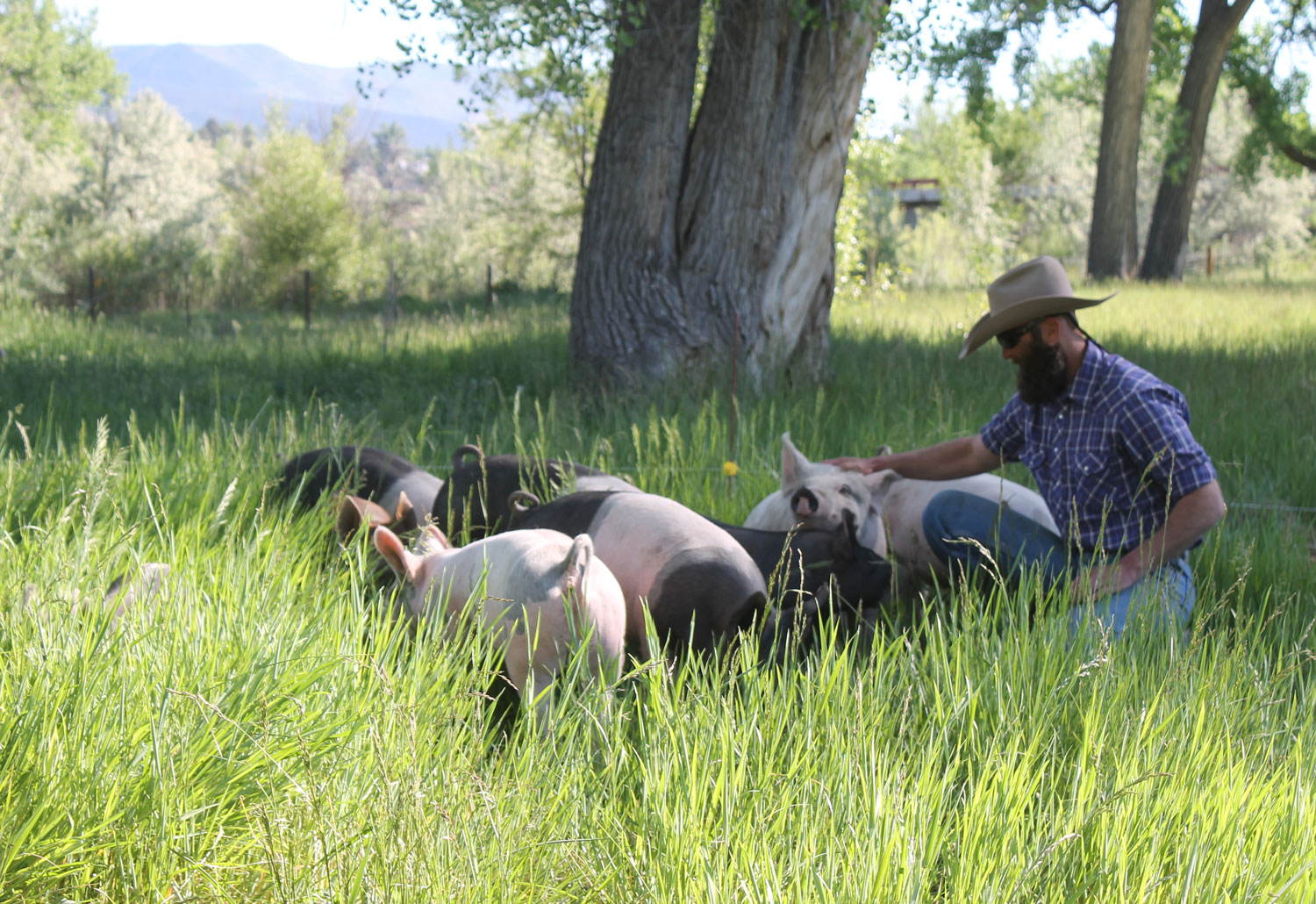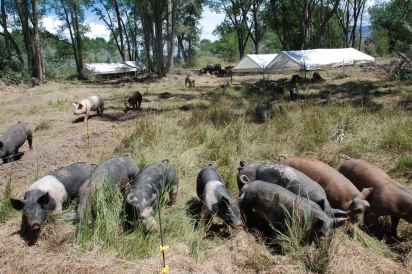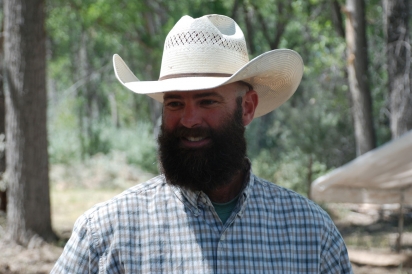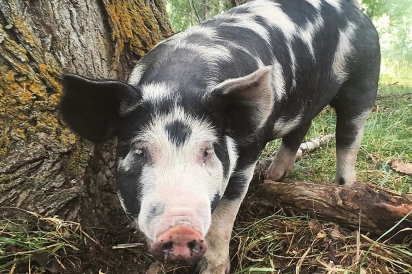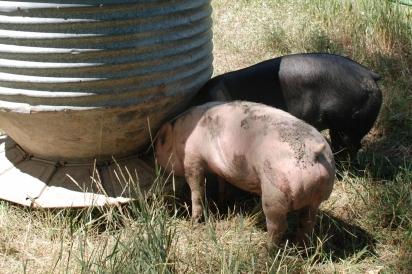Hog Wild
Humane husbandry is the hallmark at Hotchkiss's only pastured-pig farm
Locals refer to it as “the pig farm,” but it’s a far cry from the stereotypical industrial confinement operation. These hogs are free as can be, roaming 32 acres of pasture and cottonwood forest running parallel to the Gunnison River. They’re expressing their “pigness,” if you will.
In just three years’ time, Toby McPartland, owner of Colorado Pastured Pork, has made a name for himself, reaping accolades not just for the exquisite pork he produces, but for his intuitive, humane animal husbandry. “Every pig has its own personality, which makes them fun to work with,” he says. “In about five months, I’m able to build quite a bit of trust and familiarity, which also makes working with them easier and safer.”
From Peace Corps to pig farmer
A California native, McPartland, 39, studied cultural anthropology at the University of California, Santa Cruz. After graduation, he joined the Peace Corps and worked in Senegal, Guatemala, Nicaragua and Costa Rica, where he was exposed to different agricultural projects; he then returned to Santa Cruz and apprenticed at the university’s Center for Agroecology and Sustainable Food Systems (CASFS), which led to employment at various sustainable farms in California.
McPartland decided to start his own vegetable operation, and soon after purchasing the Hotchkiss property he attended a workshop at Virginia’s Polyface Farms. (Its owner, Joel Salatin, is a pioneer of sustainable/diversified farming.) Armed with information on humane livestock management, McPartland decided to try raising pigs because his land has plentiful access to water, shade and fertile soil ideal for growing supplementary feed.
“There aren’t many pastured pigs in this region right now,” he says. “I’ve had a real warm welcome by the local ranching community; many of them had never driven by a farm and seen pigs freely running in a field.” Their curiosity is exciting, he says, because “We’ll need more pastured livestock operations to meet demand.”
McPartland raises Berkshires and Herefords, heritage pigs developed in the early 19th and early 20th centuries, respectively. He cross-breeds them with the more ubiquitous Hampshire and Blue Butt hogs. “I’m more interested in developing pigs with a longer, taller physique,” he says. “They yield larger pork chops and more bacon, with really red, well-marbled, flavorful meat.” Color is also important as light-colored pigs are prone to sunburn, especially at altitude.
What his animals eat is just as important as their breeding. McPartland follows a rotational grazing model, in which he moves groups of up to 50 pigs (last year, he raised 125) every one or two weeks into fresh pasture to forage. Of protecting his piglets from area predators, he says, “For the first month they’re in the field, I’m sleeping in a tent with just my rifle and a couple of my dogs.”
All the foraging, rooting and wallowing the pigs do helps aerate the soil. It also allows them to engage in natural behaviors, something McPartland diligently encourages. Last year, McPartland coincidentally discovered that his pigs are excellent at eliminating at least one invasive species: Russian olives. “As an alternative to herbicide, I thought I’d try using the natural plowing technique they perform with their snouts as a soil disruption tool, and it worked to remove the trees, which are thorny and can take over cottonwood habitat.”
In the past, McPartland has planted turnips and radishes for his pigs to root up; this year it’s alfalfa, which makes a good protein supplement for their daily ration (a custom, non-GMO grain blend from Colorado). Once, he spread 10 dump trucks’ worth of organic apple pulp from a neighboring orchard around his pasture. (“It was gone before it could make them too drunk.”)
Although he’s able to rattle off facts and husbandry methods like a longtime pig farmer (“I read recently that pigs have the capacity to be optimists or pessimists”), it’s possible that McPartland’s relative lack of experience with pigs is the very thing that makes him so good at it. He has an innate sense of what his animals require, which is perhaps a by-product of his contemplative nature.
“I have a lot of systems in place to move the pigs in a very gentle manner,” he says. “I’ve learned this by spending countless hours observing them. When I need to load them into a trailer, I know to move them using rounded corners instead of right angles, which helps keep them calm.”
McPartland’s talent and compassionate stewardship have earned him fans amongst consumers as well as chefs in the Roaring Fork Valley. Among the latter are Allegria, in Carbondale (Chef-owner Andreas Fischbacher makes smoked pork shoulder and sausage in-house); Meat & Cheese Restaurant and Farm Shop (“The pork has the most amazing flavor,” says owner Wendy Mitchell); Bosq, L’Hostaria and catering company Field2Fork Kitchen. To these accounts, McPartland is also grateful. “It’s a certain type of chef who makes buying local a top priority,” he says.
As McPartland walks his pastures, the pigs peer up at him, nudging him playfully with their strong snouts until they receive the desired light pat or rub from their farmer. “There’s just a lot of gratitude,” he says. “They’re my livelihood and I take it really seriously; I make sure I give them all good days but one. That’s been said before, but there’s a lot of truth to it.”
GO FIND IT!
Order online at ColoradoPasturedPork.com or from Denver’s PastureProvisionsCo.com or visit Lizzy’s Market in Paonia.


